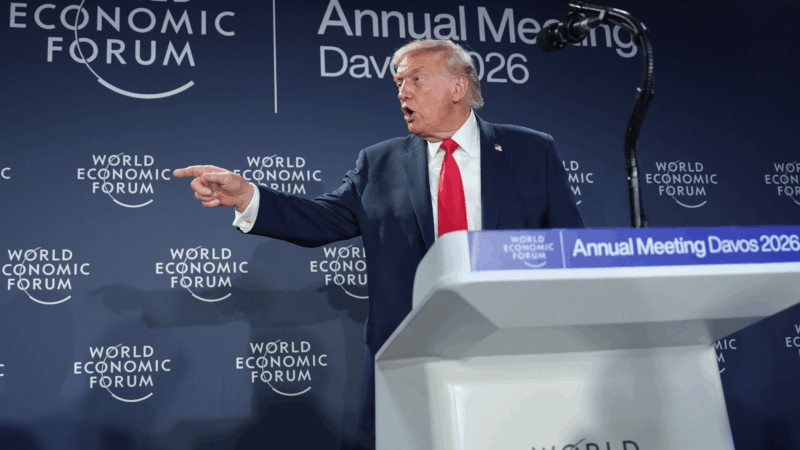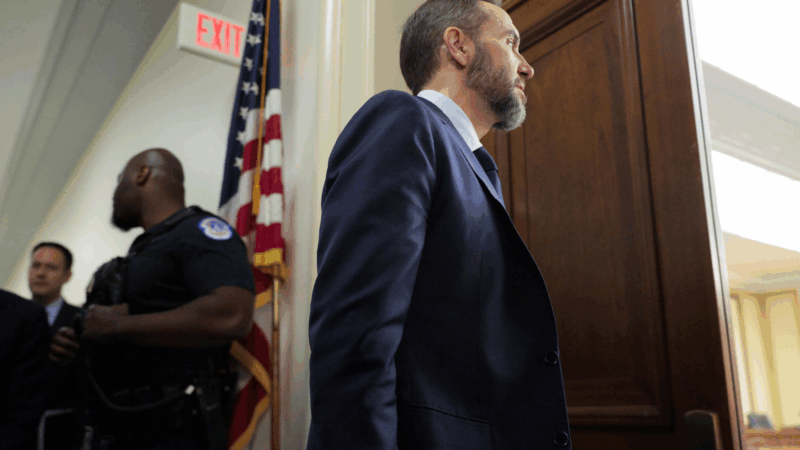Moving Palestinians out of Gaza? Trump’s idea takes on a life of its own in Israel
JERUSALEM — President Trump’s proposal to move all Palestinians out of Gaza has taken on a life of its own in Israel.
Israeli officials say they’re working on a plan to create a migration authority to help relocate the vast majority of Gaza’s two million people. A senior Cabinet minister, Bezalel Smotrich, says Israel is working with the Trump administration to locate countries that would take them in. Surveys suggest the majority of Israelis are open to the idea.
Whether it will actually happen is another matter. Dozens of Arab and Muslim-majority countries have rejected the notion as ethnic cleansing. Trump said he would not force the idea after Egypt and Jordan rejected it.
“We paid Jordan and Egypt a lot — billions of dollars a year, and I was a little surprised they’d say that, but they did,” Trump said on Fox News Radio on Feb. 21. “I think that’s the plan that really works. But I’m not forcing it. I’m just going to sit back and recommend it.”
What remains is a radically changed discourse in Israel.
The notion of expelling Palestinians, euphemistically called “transfer” in Hebrew, used to be considered extreme in Israeli politics and taboo in polite company. The party that advocated it in the 1980s was banned from Israel’s parliament as racist.
Now Trump has breathed life into the idea, and Israeli Prime Minister Benjamin Netanyahu for the first time has publicly praised it as “revolutionary.”
A poll this week from the Israel Democracy Institute found 73% of Jews living in Israel believe that, whether or not it’s practical, Trump’s plan has started “a more relevant discussion of possible solutions” for ending the war in Gaza.
“I think this idea is dramatic and crazy, but the situation is also crazy. We cannot keep living like this,” said Itamar Lavie, a 27-year-old medical student, sitting at a Jerusalem coffee shop. “I think it’s horrible to move a population, but maybe, eventually, it will be also better for them, because right now they live actually in a ghetto.”
Lawmakers in Israel discussed how to make Trump’s plan a reality
Sundays are usually slow days at the Knesset, Israel’s parliament, but many prominent right-wing lawmakers attended the caucus hearing titled “The New Middle East: The Plan For Voluntary Emigration From Gaza.”
Chinese diplomats and Panama’s ambassador to Israel were sitting at the roundtable along with Israel’s parliament speaker. On the agenda: how to turn President Trump’s recent proposal into reality.

“This has the potential for historic change,” said ultranationalist Finance Minister Smotrich at the hearing. On a visit to Washington last week, he said he told Trump administration officials that mass emigration from Gaza could “end the conflict” between Israelis and Palestinians.
Most people living in Gaza could be gone within half a year, at a rate of 10,000 people leaving per day, and Israel is working on building a migration authority to handle the logistics, Smotrich said.
“Getting the population out of there, because they are in grave danger when they stay there, and they pose a grave danger to us when they are there — this makes sense,” caucus co-chairman Simcha Rothman, a lawmaker in Israel’s governing coalition, told NPR.
Lawmakers repeated Trump’s humanitarian argument — that removing Gazans was for their own good because of the immense destruction caused by Israel’s war against Hamas following the Hamas assault on Israel Oct. 7, 2023. They also made a security argument — that the population of Gaza poses a danger to Israelis after the Hamas attack. Nearly 1,200 people were killed and 251 taken hostage in the attack that sparked the war in Gaza, according to the Israeli government, and more than 48,000 Palestinians in Gaza have been killed in Israeli strikes, according to Gaza health officials.
Some promoted other ideas: clearing away Gazans for Jewish settlement, and forced expulsion.
“It’s either us or them,” said Osher Shekalim, a lawmaker in Netanyahu’s Likud party. He said leaving Gaza should not be voluntary. “Anyone who defines themselves as Palestinian is saying, I am your enemy. I don’t want you here.”
In Gaza, some Palestinians say they’ll never agree to be displaced from their homes. Others say they’d welcome the opportunity to move away for a better life following the recent war.
Many Israelis see Gazan emigration as a good idea but not practical
There has been little vocal objection from prominent opposition politicians in Israel.

Centrist lawmaker Alon Schuster says Palestinians should be able to make up their own mind, and because many Palestinians don’t want to move, he’s afraid to evoke dark chapters of Jewish history.
“I don’t want to be in a place where the Jewish state is pushing people from their home if they don’t want to,” Schuster told NPR.
Liza Dryer, a 30-year-old Israeli dentist at a coffee shop with her dog, said the Gaza resettlement idea was ideal but would pose problems for Israel.
“I would like it to happen, but I’m not sure it’s the practical, right solution, because then there will be more stories about more lands that we took over, that we occupied, that we were violent towards. So I really feel it will lead to more harsh feelings towards Israel,” Dryer said.
In Sunday’s parliamentary caucus hearing, right-wing lawmakers acknowledged they were discussing Gazans leaving Gaza in theory. What they said was important was Trump helping shift the Israeli discourse.
Yuli Edelstein, a member of Netanyahu’s party, marveled that the idea, once forbidden to talk about, now seems “super legitimate” to discuss.
Yanal Jabarin contributed to this story.
Transcript:
ARI SHAPIRO, HOST:
President Trump’s idea to move Palestinians out of Gaza has taken on a life of its own in Israel. Israeli officials say they’re working on a plan to create a migration authority to help the people of Gaza leave. And surveys suggest the majority of Israelis are open to the idea. NPR’s Daniel Estrin reports from Jerusalem.
DANIEL ESTRIN, BYLINE: The hearing Sunday in Israel’s Parliament was titled “The New Middle East: The Plan For Voluntary Emigration From Gaza.” Ultranationalist lawmakers discussed how to turn President Trump’s recent proposal into reality.
(SOUNDBITE OF ARCHIVED RECORDING)
BEZALEL SMOTRICH: (Speaking Hebrew).
ESTRIN: Finance Minister Bezalel Smotrich said, “this has the potential for historic change.” He said most of Gaza’s 2 million people could be gone within half a year and that Israel is working with the U.S. to find countries to take them in. Chinese and Panamanian diplomats were sitting at the roundtable, chaired by right-wing lawmaker Simcha Rotman.
(SOUNDBITE OF ARCHIVED RECORDING)
SIMCHA ROTMAN: Getting the population out of there because they are in a grave danger when they stay there, and they pose a grave danger to us when they are there – this makes sense.
ESTRIN: He’s making a humanitarian case, removing Gazans from the destruction after Israel’s war on Hamas, and a security argument that the whole population of Gaza poses a danger to Israelis after the Hamas attack, October 7, 2023. In Gaza, some say they’ll never agree to be displaced from their homes. Others say they’d welcome the opportunity to move away for a better life.
(SOUNDBITE OF ARCHIVED RECORDING)
OSHER SHEKALIM: (Speaking Hebrew).
ESTRIN: Lawmaker Osher Shekalim, in Prime Minister Benjamin Netanyahu’s party, said leaving Gaza should not be voluntary. “It’s either us or them,” he said. “Anyone who defines themselves as Palestinian is saying, I am your enemy. I don’t want you here.”
(SOUNDBITE OF ARCHIVED RECORDING)
SHEKALIM: (Speaking Hebrew).
ESTRIN: The concept of Palestinian population transfer used to be considered taboo in Israel. The party that advocated it in the 1980s was banned from Parliament as racist. Now Trump and Netanyahu praise the idea. A poll this week from the Israel Democracy Institute found 73% of Jews living in Israel believe that, whether or not it’s practical, Trump’s plan has started a more relevant discussion of possible solutions for ending the war.
At an outdoor coffee shop in Jerusalem, several Israelis say getting Gazans to leave Gaza would pose problems but might be ideal – 27-year-old medical student Itamar Lavie.
ITAMAR LAVIE: I think this idea is dramatic and crazy, but the situation is also crazy. We cannot keep living like this. I think it’s horrible to move population, but maybe, eventually, it will be also better for them because right now they live actually in a ghetto.
ESTRIN: A few tables over is 30-year-old dentist Liza Dryer with her dog.
LIZA DRYER: I would like it to happen, but I’m not sure it’s the practical, right solution because then there will be more stories about more lands that we took over, that we occupied, that we were violent towards. So I really feel it will lead to more harsh feelings towards Israel.
ESTRIN: President Trump’s idea is to get Gazans away from the rubble and resettle them in neighboring countries to have better lives. Dozens of Arab countries have rejected displacement, calling it ethnic cleansing. There’s little objection from prominent opposition politicians in Israel. Centrist lawmaker Alon Schuster says Palestinians should be able to make up their own mind, but he’s afraid to evoke dark chapters of Jewish history.
ALON SCHUSTER: Don’t want to be in a place where the Jewish state is pushing people from their home if they don’t want to.
(SOUNDBITE OF ARCHIVED RECORDING)
YULI EDELSTEIN: (Speaking Hebrew).
ESTRIN: The right-wing lawmakers in the hearing acknowledged they were discussing Gazans leaving Gaza in theory. What they said was important was Trump helping shift the Israeli discourse.
(SOUNDBITE OF ARCHIVED RECORDING)
EDELSTEIN: (Speaking Hebrew).
ESTRIN: As Yuli Edelstein, a member of Netanyahu’s party, said, something that was once forbidden to talk about now seems, quote, “super legitimate to discuss.” Daniel Estrin, NPR News, Jerusalem.
(SOUNDBITE OF BADBADNOTGOOD’S “TIMID, INTIMIDATING”)
Rahm Emanuel steers a course between ‘monopolists’ and ‘Marxists’
NPR's Steve Inskeep speaks with longtime Democrat Rahm Emanuel about politics in the Trump era.
Trump vs. U.S. allies: How will this end?
The president has backed off his threat to take Greenland by force. But his highly inflammatory remarks in Switzerland rattled U.S. allies and threatened to tear down the pillars of the world order.
Jack Smith to defend Trump investigations to House Republicans
Jack Smith's appearance before the House Judiciary Committee marks the first open testimony about his work after presiding over two federal criminal indictments of President Trump.
Some voters who backed Trump say ICE is going ‘too far’
A new focus group of Biden-to-Trump voters weighs in on immigration operations and Trump's foreign affairs leadership on Greenland and Venezuela.
The ICE surge is fueling fear and anxiety among Twin Cities children
Some families aren't leaving their homes as aggressive ICE operations continue in Minnesota, leaving their children confined and stressed. Across the Twin Cities, kids are anxious and afraid.
Israeli fire strikes journalists and children in Gaza
Israeli forces on Wednesday killed at least 11 Palestinians in Gaza, including two boys, three journalists and a woman, hospitals said, on one of the enclave 's deadliest days since the ceasefire took effect.






